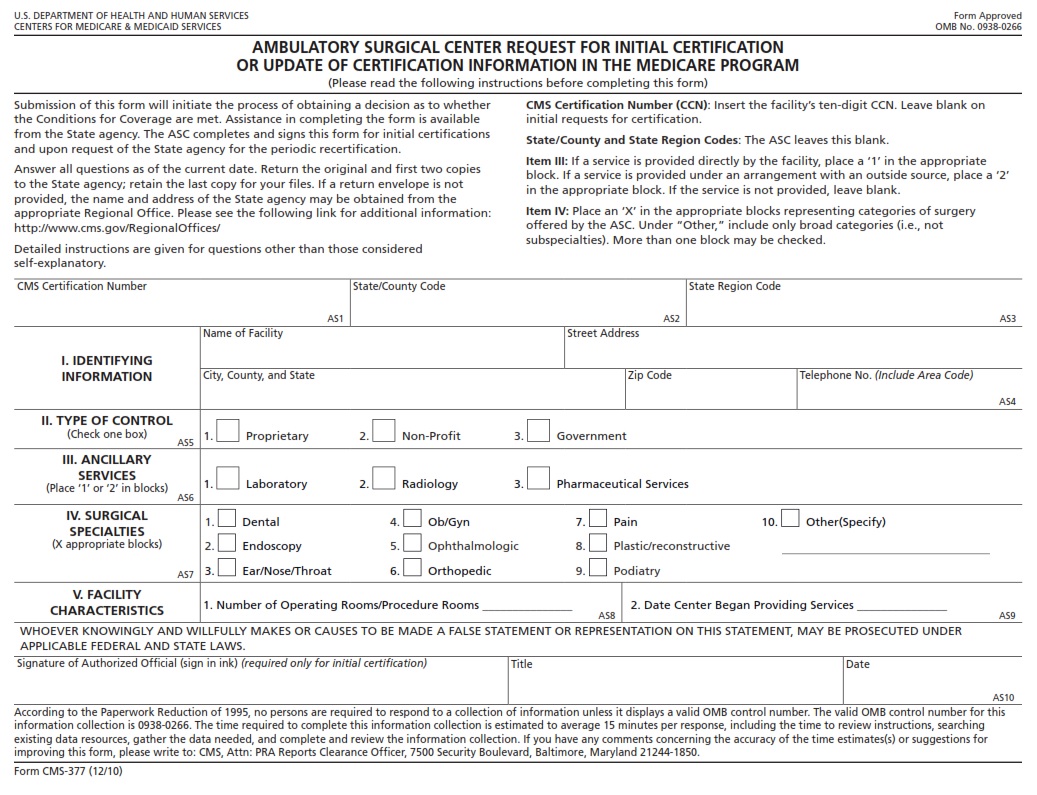CMSFORM.ORG – CMS 377 – AMBULATORY SURGICAL CENTER REQUEST FOR CERTIFICATION IN MEDICARE – As the healthcare landscape continues to evolve, the role of ambulatory surgical centers (ASCs) in providing efficient and cost-effective care has become increasingly pivotal. In this era of advancing medical technology and patient-centered care, CMS 377 – Ambulatory Surgical Center Request for Certification in Medicare stands at the forefront as a critical document that shapes the future of these facilities. From enhancing accessibility to surgical procedures outside traditional hospital settings to optimizing recovery times and reducing healthcare costs, ASCs offer a multitude of benefits for both patients and providers alike.
Imagine stepping into a modern facility where state-of-the-art equipment meets personalized care, revolutionizing the way surgeries are conducted. The quest for CMS certification not only signifies adherence to strict quality standards but also symbolizes a commitment to excellence in outpatient surgical services. Join us on an exploration of how ASCs are redefining the healthcare experience, empowering patients with choice and convenience while ensuring top-notch medical outcomes across diverse specialties.
Download CMS 377 – AMBULATORY SURGICAL CENTER REQUEST FOR CERTIFICATION IN MEDICARE
| Form Number | CMS 377 |
| Form Title | AMBULATORY SURGICAL CENTER REQUEST FOR CERTIFICATION IN MEDICARE |
| Published | 0021-02-28 |
| O.M.B. | 0938-0266 |
| File Size | 223 KB |
CMS 377 - AMBULATORY SURGICAL CENTER REQUEST FOR CERTIFICATION IN MEDICARE (2521 downloads )
What is a CMS 377?
A CMS 377 form is an essential document for ambulatory surgical centers seeking certification in Medicare. This form serves as a request for certification and outlines the center’s compliance with Medicare requirements related to patient care, safety protocols, and quality standards. It is a crucial step for ASCs looking to participate in the Medicare program and highlights their commitment to delivering high-quality healthcare services.
By completing the CMS 377 form, ambulatory surgical centers demonstrate accountability and transparency in their operations, ensuring that they meet the strict guidelines set forth by Medicare. This process not only benefits the ASCs by opening up opportunities for reimbursement from Medicare but also reassures patients of the center’s dedication to maintaining excellence in care delivery. Ultimately, the CMS 377 form plays a pivotal role in establishing trust between ASCs, patients, and regulatory bodies, paving the way for successful collaboration in ensuring optimal healthcare outcomes.
Where Can I Find a CMS 377?
If you’re in search of a CMS 377 form for an Ambulatory Surgical Center certification, the first place to look is the official Medicare website. Here, you can navigate through the various forms and easily locate the CMS 377 document. Additionally, reaching out to your regional Medicare administrative contractor can provide you with specific guidance on where to find and submit the necessary paperwork for certification.
For those who prefer a more hands-on approach, visiting your local Medicare office or contacting their helpline can also lead you in the right direction. Remember that while finding a CMS 377 form may seem like a daunting task at first, there are multiple resources available to assist you in obtaining this essential document for Ambulatory Surgical Center certification.
CMS 377 – AMBULATORY SURGICAL CENTER REQUEST FOR CERTIFICATION IN MEDICARE
Navigating the process of obtaining certification in Medicare for an Ambulatory Surgical Center under CMS 377 can be a critical juncture for healthcare facilities. The stringent requirements and complex documentation needed to meet compliance standards can seem overwhelming at first glance. However, viewing this process as an opportunity to enhance the quality of care provided and streamline operational efficiency can shift perspectives positively. By aligning with Medicare guidelines, ASCs not only ensure reimbursement but also demonstrate commitment to patient safety and best practices in healthcare delivery.
One key aspect often overlooked is thorough preparation and ongoing monitoring post-certification. Establishing robust internal processes for documentation, staff training, and regulatory compliance sets the stage for long-term success. Engaging with consultants or professionals specializing in CMS 377 accreditation can provide invaluable insights into industry best practices and up-to-date regulatory changes. Embracing a culture of continuous improvement within the ASC framework not only drives quality outcomes but also fosters trust among patients seeking advanced surgical care in ambulatory settings.
